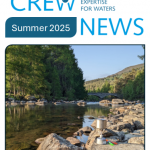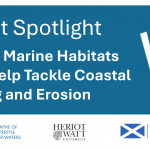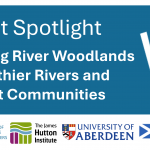Sharing Insights on Hydropower and Sediment Management
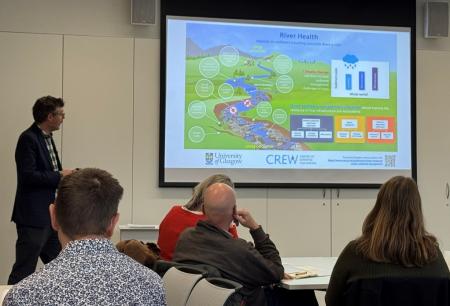
Great discussions were held this week at a hybrid hydro-sector dissemination event at the Advanced Research Centre (University of Glasgow), where Professor Richard Williams presented findings from the CREW project, “Environmentally effective and cost-efficient sediment management at impoundments.”
The team showcased their insightful project video, available here and also shared an infographic illustrating how river health relies on sediment flow (pictured).
The event also featured:
- A presentation of a guidance framework for best practice in hydropower licensing applications, which was developed as part of the project.
- A presentation by Professor Nick Hanley about the project’s cost-benefit analysis for catchment sediment management.
- Engaging round-table discussions on the project report’s recommendations. The most popular of which being how to raise awareness of sediment management within the hydropower community.
Learn more here: Environmentally effective and cost-efficient sediment management at impoundments | CREW | Scotland's Centre of Expertise for Waters
CREW would like to thank the research team (University of Glasgow and cbec eco engineering) and the Project Steering Group (Scottish Environment Protection Agency, Scottish Canals, NatureScot and the Scottish Government) for their dedication and support to the project and in addressing this important issue.
Environmentally effective and cost-efficient sediment management at impoundments
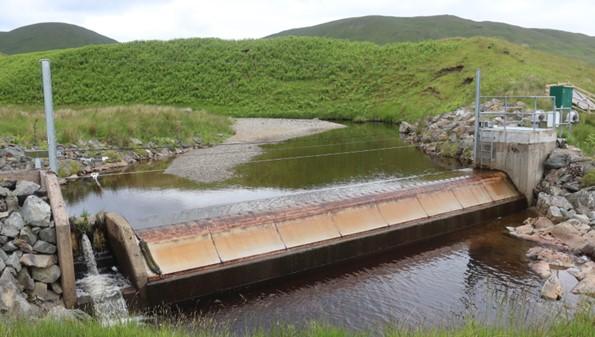
Impoundments on rivers are often critical for purposes such as power generation and water supply yet they can also reduce or prevent the natural movement of sediment downstream. Accumulation of sediment behind an impoundment can pose a risk to its intended use and result in adverse ecological consequences downstream due to sediment not being naturally replenished. This project developed initiatives to raise awareness of the commercial and environmental risks associated with sediment discontinuity caused by impoundments.
Knowledge exchange activities with the hydropower community enabled the production of a video and infographic to communicate key messages. A hydropower scheme permit application guidance framework was also developed to assist both operators and regulators. Cost-benefit analysis evaluated the environmental and commercial effectiveness of various catchment sediment management options. Riparian planting and peatland restoration delivered a positive benefit in all cost-benefit scenarios, and in most scenarios, catchment-scale tree planting also generated positive benefits.
SEPA and NatureScot have key leadership roles in disseminating these findings to the hydropower community and in managing rivers more broadly. The project also demonstrated a need within the hydropower community for further knowledge exchange activities which would likely maintain or improve river catchment health and reduce commercial risk.
Project outputs
Full length video: Securing Scotland's Energy Future: Sediment Management in Hydropower
CD2024_03 Scottish One Health AMR Register (SOHAR): Updated research insights
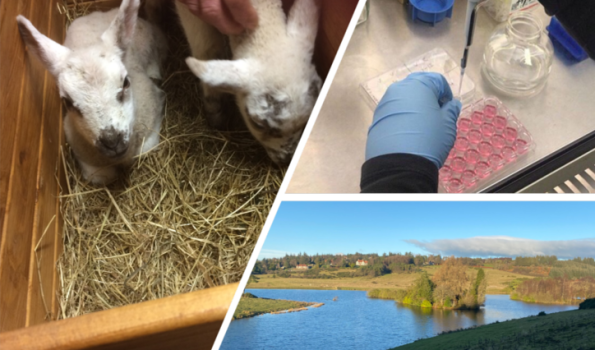
CREW Code: CD2024_03
Project status: Project complete. Click here to visit the publication page to view the project outputs.
Type of project: Call Down
Lead research team: University of Strathclyde
Antimicrobial resistance (AMR) occurs when bacteria, viruses, fungi or other microbes change in ways that stop medicines, like antibiotics, from working properly. This makes infections harder to treat and increases the risk of them spreading, lasting longer, or becoming more serious.
The Scottish One Health AMR Register (SOHAR) brings together AMR-related research involving Scottish researchers and organisations. It shows how Scotland is contributing to national efforts and helps identify where more work is needed.
The 2025 SOHAR update reviewed 952 research publications and projects that were published or active between July 2021 and May 2025. It found evidence of progress in areas such as innovation, antimicrobial stewardship, and environmental AMR. Scotland also continues to contribute to AMR surveillance across sectors and plays an active role in UK-wide transdisciplinary AMR networks. However, several areas remain underrepresented, including animal health, food systems, behaviour change, public awareness, health inequalities, and translating research innovation into practice.
To build on Scotland’s progress, five key actions are recommended: i) maintain regular updates to SOHAR; ii) improve SOHAR’s accessibility and utility; iii) use SOHAR to monitor Scotland’s progress on AMR research goals; iv) invest in underrepresented research areas; and v) support transdisciplinary research to strengthen links between knowledge, policy, practice, and innovation.
This project has completed. Click here to visit the publication page to view the project outputs.
Scotland Explores New Strategies to Monitor Freshwater and Wetland Ecosystems
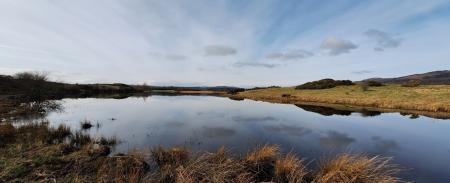
Scotland Explores New Strategies to Monitor Freshwater and Wetland Ecosystems
A recent mid-project workshop has brought together leading experts to rethink how freshwater and wetland ecosystems are monitored across Scotland. The goal of this current CREW project is to create a more dynamic, resource-efficient approach to ecosystem health monitoring that aligns with Scotland’s commitment to halt biodiversity loss by 2030.
Participants from across 14 different organisations identified challenges with current Site Condition Monitoring (SCM) methods, which often assess habitats and species in isolation. This approach can overlook broader environmental pressures, such as climate change, diffuse pollution, and invasive species. As Scotland prepares for an expanded network of protected areas, experts called for a shift towards monitoring that considers entire landscapes and ecosystems.
Key recommendations from the workshop included using innovative technologies, such as environmental DNA (eDNA) and remote sensing, to enhance data collection and analysis. Collaboration and data-sharing across organisations were emphasised as essential to optimising resources and addressing data gaps. Participants also highlighted the potential for citizen science initiatives to engage communities in monitoring efforts.
CREW would like to thank the research team (the University of Dundee) and the Project Steering Group (NatureScot, SEPA and the Scottish Government) for their continued efforts on this project which will be completed in the new year.
For more information, please visit the project page.
Increasing flood resilience: residential and community runoff retention solutions
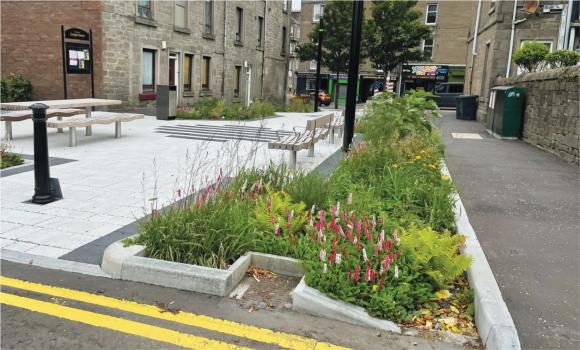
In recent years there has been an increased awareness of the need to address surface water runoff in urban environments. This includes understanding where flood risks may arise, increase, or change in the future due to climate change and increased urban creep, the increased conversion of gardens and other vegetated areas which help to soak up rain. To support resilient surface water management in urban environments, the identification, efficacy, cost effectiveness and prioritisation of implementable flood risk management solutions is essential.
This project evaluated and compared the cost and effectiveness of residential and community property rainwater runoff source control solutions to increase flood resilience. Source control Sustainable Drainage Systems (SuDS) manage water at or near its source, in order to slow down or stop the water entering the drainage system.
The project undertook a literature review, case study reviews and cost benefit analysis to consider the following key issues:
- What are the multiple benefits of source control SuDS and suitability for different urban land types?
- What are the barriers to adopting these solutions at both residential and community property level?
- What are the opportunities and recommendations for overcoming these barriers?
Project Outputs
Understanding the relationship between water scarcity and land use in private water supply catchments – a review
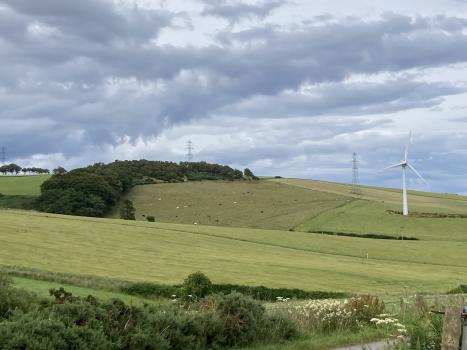
This project aimed to compile an evidence base and offer recommendations informing policy and practice regarding how land use changes may impact the amount of water available to private water supplies (PWS). The focus was on the impacts to water availability from emerging land use trends of tree planting (afforestation and agroforestry) and wind farm development in Scotland.
The project involved a review of the available scientific evidence and a review of international PWS policies and practices considering PWS in relation to tree planting and wind farm development, and stakeholder engagement. Key findings included that tree planting effects on water availability vary widely based on a complex set of inter-related factors, such as timing, spatial orientation, extent of planting, tree species, and landscape characteristics, including previous land use. Agroforestry effects are generally smaller than for afforestation, but they are more sensitive to specific planting details. Wind farm effects also depend on landscape factors and specific characteristics like type, number, and density of turbines, with limited research available for Scottish landscapes.
The key findings of the project emphasize the need for better data, data availability, integrated policies, and stakeholder engagement to prevent negative impacts on PWS amidst changing land use change trends.
Previous project page
Securing Scotland's Energy Future: The Crucial Role of Sediment Management in Hydropower
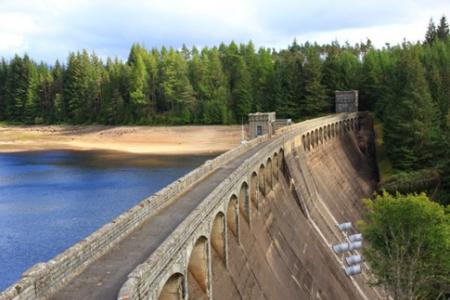
In line with the Scottish Government's goal of achieving net zero emissions by 2045, a new CREW project carried out by researchers at the University of Glasgow and CBEC eco-engineering is shedding light on sediment management in hydropower operations. This initiative aims to raise awareness about the impact of sediment delivery to hydropower structures and explore the potential economic implications of these changes, particularly in the face of climate change.
Background and Scope
The project builds upon an earlier CREW study, Sediment continuity through run-of-river hydropower schemes | CREW | Scotland's Centre of Expertise for Waters which was the first of its kind to assess the impacts of sediment continuity on run-of-river hydropower structures in Scotland. The study revealed a highly variable impact on sediment continuity, with some cases showing significant implications for project resilience and sustainability. While this earlier research provided valuable insights, it also revealed significant knowledge gaps, particularly concerning the financial ramifications of sediment management issues. The current project aims to address these gaps by engaging hydropower operators across Scotland through outreach activities and conducting a comprehensive cost-benefit analysis of sediment management practices.
Project Objectives
The project has two primary aims:
- Raising Awareness: Improve understanding in the hydropower sector on basic river geomorphological processes and the impact of sediment continuity (or discontinuity) for river habitats and species.
- Understanding Economic Impacts: Highlighting the commercial risks and benefits associated with different sediment management options, especially considering increased sediment delivery due to climate change.
Achieving these objectives is expected to streamline the permit process for hydropower operators and regulatory bodies like SEPA (Scottish Environment Protection Agency), ultimately contributing to more sustainable hydropower operations in Scotland.
To facilitate this, a stakeholder workshop was held at the University of Glasgow. The workshop provided a platform for meaningful dialogue among 20 invited stakeholders from the hydropower sector, including representatives from industry, NGOs, environmental consultants, and public agencies. The discussions were led by an independent facilitator and centred around four core activities.
Activities and Key Insights
- Sediment Management Challenges: Participants discussed their experiences and knowledge gaps regarding sediment management. Key insights included the need for clearer regulatory guidelines, better design considerations for hydropower structures to handle sediment and more collaborative approaches to managing sediment continuity.
- Impacts and Best Practices: Stakeholders addressed the financial and environmental costs of different sediment management practices, with stakeholders identifying both proactive and reactive measures. The costs associated with different practices varied significantly, underscoring the need for a comprehensive cost-benefit analysis.
- Case Study Scenarios: Groups analysed hypothetical hydropower scenarios to explore environmental and operational impacts of sediment transport, considering future climate change projections. The discussions revealed concerns over potential damage to hydropower structures and the increased costs of sediment management, which could threaten the financial viability of some schemes.
- Communication Strategies: The workshop concluded with brainstorming on effective ways to communicate sediment management challenges to a broader audience. Participants suggested various formats, including videos, infographics, interactive animations, and social media content.
Outcome and Moving Forward
Feedback from the workshop highlighted the need for a collaborative approach with proactive sediment management strategies. Participants emphasized the importance of clear, focused regulatory frameworks and educational initiatives from regulators.
As the project progresses, the insights gained from the workshop will inform the development of practical guidelines and communication materials to support the hydropower sector in navigating sediment management challenges. By directly engaging stakeholders, the project aims to align hydropower practices with Scotland's net zero aspirations, ensuring resilient and sustainable energy production for the future.
The ongoing engagement and dissemination efforts (including a video, report and infographic) will be crucial in transforming awareness into action, enabling Scotland's hydropower sector to adapt effectively to the evolving environmental landscape. Watch this space for project outputs, including a report, plain language summary, and a video highlighting basic river processes and how they relate to sediment management by hydropower schemes.
CREW would like to thank the research team (University of Glasgow and cbec- eco-engineering) and the Project Steering Group (SEPA, NatureScot, and Scottish Canals) for their dedication and support to the project and in addressing this important issue.
PFAS in drinking water supplies: A review of source, pathway, and fate for selected compounds
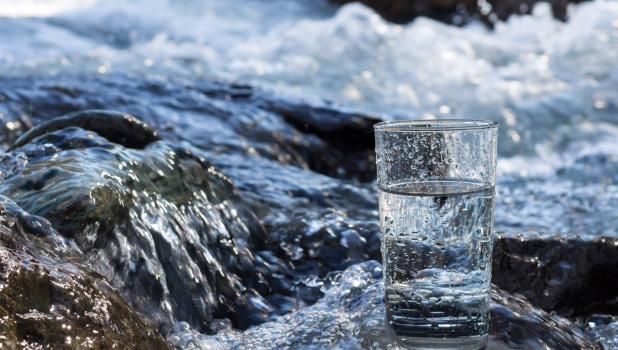
PFAS are a large group of synthetic chemicals with many industrial and domestic applications. In Scotland, a drinking water standard of 0.1 µg/l for the sum of 20 PFAS substances was introduced in January 2023.
Many different PFAS may be present in Scotland due to import and use. Next to PFAS coming from local pollution sources such as landfills, wastewater, and industry uses, they can also be transported through the air over long distances and be brought to land from the ocean on sea spray aerosols. They can reach freshwater directly or move through soils to groundwater and surface water. Which PFAS are found (and relative mixtures) can give an indication where they originate from.
Identifying potential sources of PFAS pollution and analysing available PFAS concentration data helped to better understand where PFAS may be found in Scotland. Higher risk for PFAS pollution was identified for areas in the Northeast, Central belt, and South of Scotland due to industrial activity and higher population densities, but also for some regions on the West coast. Although measured concentrations of PFAS currently remain well below the drinking water standard, the findings can support a systematic monitoring of higher risk areas to ascertain PFAS pollution in the Scottish environment.
Water Scarcity in Scotland: Future Impact for Distilleries and Agriculture
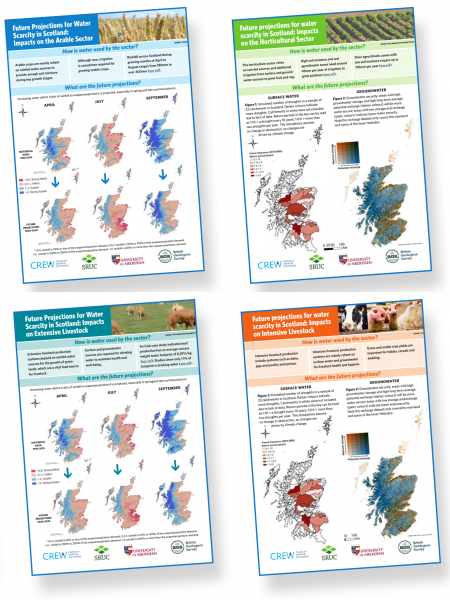
A recent CREW project led by The James Hutton Institute, in collaboration with Scotland’s Rural College, the University of Aberdeen, and the British Geological Survey, highlighted a pressing issue for Scotland: the increasing likelihood and duration of water scarcity events due to climate change. This project, focused on the impact of these changes on three critical sectors—crop production, livestock farming, and distilleries. The findings are vital for understanding future water availability and preparing for water scarcity.
Water resources in Scotland are crucial for various agricultural activities and the world-renowned whisky distilleries. Crop producers and livestock farmers rely heavily on rainfall to nourish barley and grass, essential for both crop yield and animal feed. Surface water from rivers, burns, and lochs, alongside groundwater, is used extensively for irrigating crops, cooling alcohol, and providing drinking water for livestock.
Projections up to 2049 suggest significant reductions in summer and early autumn rainfall, particularly in eastern Scotland, a major agricultural hub. This reduction will likely double the frequency of low river flow events by 2050. For instance, the River Spey, which is important for Scotch whisky production, could see significant low flows increase from once every five years to biennially.
The researchers created a new framework to conduct an initial water security risk assessment, taking into account aquifer storage capacity and recharge rates throughout Scotland. In Eastern and Central Scotland, the long-term average groundwater recharge is expected to decline, increasing the vulnerability of aquifers to long-term depletion.
Stakeholders across various sectors reported that water scarcity is increasingly problematic for their businesses, with negative impacts already being felt. Whilst this project focused on projections for future scenarios, it is important to recognize that significant water scarcity events are already happening:
- Crop Production: Reduced rainfall during critical growth stages leads to lower crop yields and diminished farm incomes. The scarcity of water for irrigation, especially during drought periods, could result in crop failures, particularly for vegetables and fruits.
- Livestock Farming: Reduced grass growth affects feed availability and herd productivity. Additionally, reduced water access and higher temperatures can adversely affect animal health.
- Distilleries: The whisky industry faces potential production halts due to increased low-flow events in rivers, necessitating water restrictions.
To address the impacts of water scarcity across these sectors, stakeholders are implementing measures to mitigate these effects:
- Efficient Irrigation: Adoption of more efficient irrigation methods is encouraged, however introducing more water-demanding crops should be avoided.
- Water Storage: Increasing water storage during winter, when rainfall is projected to increase, can provide a buffer during scarcity events. Rainwater harvesting for livestock use is also a viable option.
- Soil and Groundwater Management: Enhancing soil organic matter can improve water retention, supporting crop growth and promoting groundwater recharge. Nature-based solutions to temporarily hold and percolate water into the ground are also being considered, though their large-scale effectiveness requires further research.
- Technological Advances: The distilling sector is exploring technologies to reduce water usage in cooling processes, though these can be energy intensive.
Despite awareness of these adaptive measures, stakeholders, particularly in crop and livestock sectors, face challenges in implementation. Financial constraints and the need for innovative technologies or new infrastructure pose significant hurdles. The research underscores the need for better data, monitoring, and improved early warning systems to help key Scottish industries adapt to climate change. Scotland's water scarcity challenge necessitates proactive measures across agricultural and distilling sectors to ensure resilience against future droughts. Continued research, stakeholder engagement, and strategic planning will be critical in addressing these emerging water resource challenges.
Read more about the findings from this CREW report and access the infographics produced here
Assessing the impact of forestry on water quality in Scotland: A review of modelling capabilities
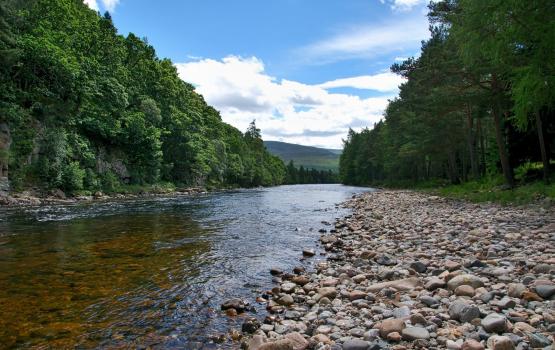
Commercial forestry operations potentially exert various influences on water quality, with impacts varying depending on the type of forestry operations and their interactions with local environmental conditions. Although the relative impacts of commercial forest activities to water are relatively small (compared to other land-uses), localised impacts on water quality can be significant and the existing literature highlights a critical gap in the connection between water quality and forest management, especially with regards to interactions between multiple environmental parameters and forestry activities. This project aimed to assess suitability of existing models in predicting these impacts. This study noted that although existing models are valuable for assessing forestry impacts, many do not fully integrate water quality considerations and forestry activities as inputs. The project findings highlight a gap in data availability as well as modelling efforts to couple water quality dynamics with forestry operations.


